2019-2020年整理外研版英语八年级上册词汇练习汇编
Module1词汇检测题外研版英语八年级上册含答案

外研版八年级上册Module!词汇检测II.词性变化5. mean--- (名词)1. practise --- (名词)2. pronounce--- ________ (名词) 6. suggest---______ (名词)3. nature--- ________ (形容词)7. quick--- (副词)4. advice--- ________ (动词)in.词组翻译1.犯错误2.欢迎回来3.谈论某事4.学英语的好办法5.在课堂上6.尽力做某事7.尽可能多地8.写下9.在我们的笔记本里10.正确的答案11.听收音机12对...有好处13.如此多的新单词14.需要做某事15.听关键词16.主要观点17.知道18.通过阅读19.笔友20给他们写信21.同意某人22.学英语的建议23通过录音机24.查找25.请求,要求26.提高他们的英语水平27.主要的问题28.好几次29.生词的意思30.每次31.新的东西32建议某人做某事33.害怕做某事34跟某人说话35.开始谈话36.向某人微笑37.把某物放在…里面38.擅长39.给一些建议40提高某人的口语水平41.练习口语42.带领某人参观43.给一些建议IV.根据句意及汉语提示拼写单词。
(1-5每空一词,6-10每空词数不限。
)1.当你遇到新单词时,不要总是查词典。
When you meet a new word, don,t always it in the.2.为什么不两人一组问答这些句子呢?ask and answer these sentences ?3.每天读半小时的英语报纸怎么样?How for half an hour every day?4.你为什么不在课堂上尽可能多地练习说英语?you practise speaking English___________ ___________ in class?5.在课堂上尽量认真听老师讲课。
外研版2019-2020学年八年级英语上册Module 2 My home town and my country模块测试题及答案
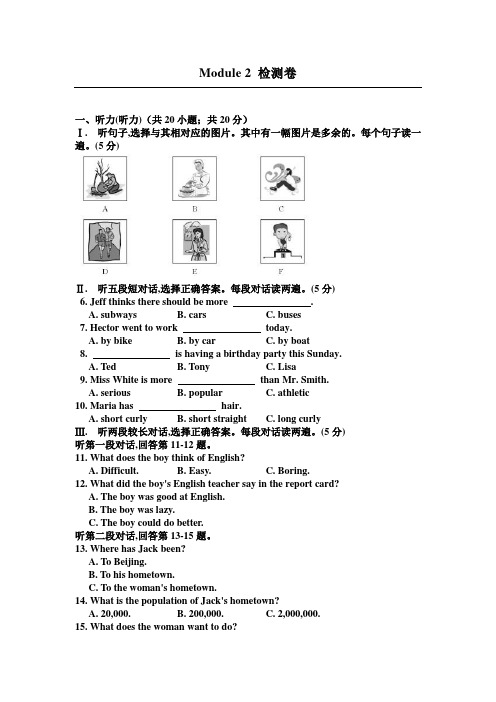
Module 2 检测卷一、听力(听力)(共20小题;共20分)Ⅰ. 听句子,选择与其相对应的图片。
其中有一幅图片是多余的。
每个句子读一遍。
(5分)Ⅱ. 听五段短对话,选择正确答案。
每段对话读两遍。
(5分)6. Jeff thinks there should be more .A. subwaysB. carsC. buses7. Hector went to work today.A. by bikeB. by carC. by boat8. is having a birthday party this Sunday.A. TedB. TonyC. Lisa9. Miss White is more than Mr. Smith.A. seriousB. popularC. athletic10. Maria has hair.A. short curlyB. short straightC. long curlyⅢ. 听两段较长对话,选择正确答案。
每段对话读两遍。
(5分)听第一段对话,回答第11-12题。
11. What does the boy think of English?A. Difficult.B. Easy.C. Boring.12. What did the boy's English teacher say in the report card?A. The boy was good at English.B. The boy was lazy.C. The boy could do better.听第二段对话,回答第13-15题。
13. Where has Jack been?A. To Beijing.B. To his hometown.C. To the woman's hometown.14. What is the population of Jack's hometown?A. 20,000.B. 200,000.C. 2,000,000.15. What does the woman want to do?A. To return to her own hometown.B. To go to the man's hometown.C. To go hiking with the man.Ⅳ. 听短文,选择正确答案。
最新版2019-2020年外研版八年级英语上册Module8综合能力评估测试及答案-精编试题

综合能力评估试题-Module 8 Accidents一、听力(听力)(共20小题;共20分)一、听力理解(本大题共20小题,每小题1分,共20分)A)在下列每小题内,你将听到一个句子并看到供选择的A、B、C三幅图画。
找出与你所听到的句子内容相匹配的图画。
1. A. B. C.2. A. B. C.3. A. B. C.4. A. B. C.B)下面你将听到十组对话,每组对话都有一个问题。
根据对话内容,从每组所给的A、B、C三个选项中,找出能回答所提问题的最佳选项。
5. What shouldn't the girl wear to the party?A. Her T-shirt.B. Her jeans.C. Her skirt.6. How's the weather today?A. Warm.B. Hot.C. Cold.7. What will the boy bring to David's home?A. Some food.B. Some flowers.C. Some books8. What do Kay's parents want her to do?A. To go to college.B. To play basketball.C. To find a job.9. What did Sarah lose?A. Her bike.B. Her keys.C. Her wallet.10. Who is a basketball player?A. John.B. John's father.C. John's uncle.11. What does Jenny want to be?A. A teacher.B. A writer.C. A reporter.12. When is Tina going to take guitar lessons?A. Next year.B. Next month.C. Next week.13. Why do they think there will be fewer trees and flowers in the future?A. Because of the weather.B. Because of the pollution.C. Because people cut them down.14. How many robots does Mary want in her family?A. One.B. Two.C. Three.C)听下面长对话或独白。
外研版英语八年级第一学期(Module11)单元练习试卷(含解析)
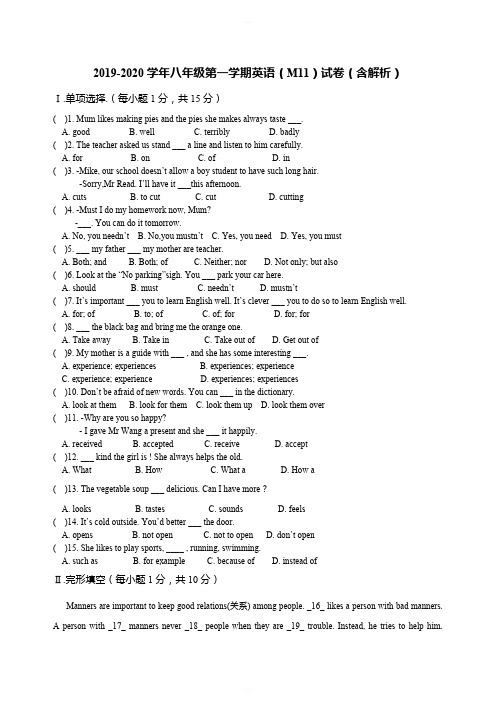
2019-2020学年八年级第一学期英语(M11)试卷(含解析)Ⅰ.单项选择.(每小题1分,共15分)( )1. Mum likes making pies and the pies she makes always taste ___.A. goodB. wellC. terriblyD. badly( )2. The teacher asked us stand ___ a line and listen to him carefully.A. forB. onC. ofD. in( )3. -Mike, our school doesn’t allow a boy student to have such long hair.-Sorry,Mr Read. I’ll have it ___this afternoon.A. cutsB. to cutC. cutD. cutting( )4. -Must I do my homework now, Mum?-___. You can do it tomorrow.A. No, you needn’tB. No,you mustn’tC. Yes, you needD. Yes, you must( )5. ___ my father ___ my mother are teacher.A. Both; andB. Both; ofC. Neither; norD. Not only; but also( )6. Look at the “No parking”sigh. You ___ park your car here.A. shouldB. mustC. needn’tD. mustn’t( )7. It’s important ___ you to learn English well. It’s clever ___ you to do so to learn English well.A. for; ofB. to; ofC. of; forD. for; for( )8. ___ the black bag and bring me the orange one.A. Take awayB. Take inC. Take out ofD. Get out of( )9. My mother is a guide with ___ , and she has some interesting ___.A. experience; experiencesB. experiences; experienceC. experience; experienceD. experiences; experiences( )10. Don’t be afraid of new words. You can ___ in the dictionary.A. look at themB. look for themC. look them upD. look them over( )11. -Why are you so happy?- I gave Mr Wang a present and she ___ it happily.A. receivedB. acceptedC. receiveD. accept( )12. ___ kind the girl is ! She always helps the old.A. WhatB. HowC. What aD. How a( )13. The vegetable soup ___ delicious. Can I have more?A. looksB. tastesC. soundsD. feels( )14. It’s cold outside. You’d better ___ the door.A. opensB. not openC. not to openD. don’t open( )15. She likes to play sports, ____ , running, swimming.A. such asB. for exampleC. because ofD. instead ofⅡ.完形填空(每小题1分,共10分)Manners are important to keep good relations(关系) among people. _16_ likes a person with bad manners.A person with _17_ manners never _18_ people when they are _19_ trouble. Instead, he tries to help him.)22. A. sneezes (打喷嚏) B. smokes C. drinks D. eats)23. A. And B. So C. With D. For)24. A. Because B. If C. Although D. Then)25. A. sorry B. thank you C. OK D. not at all阅读理解(每小题2分,满分10分)Prince William got a new job as an air ambulance pilot on Monday. He felt nervous but excited about his new job.Prince William has got the training from traffic accidents to heart attacks before his new job. Then he started to worked to work for East Anglian Air Ambulance(东盎格鲁空中救护). Though he has the charity job,William will continue his royal(王室的) duties. As an air ambulance pilot, he will work for nine and a halfhours per day in the first few months. He will work four days and then have four days off. He will work less in the future.“I think doing a job like this really helps me a lot and that’s part of my dream,”William said.”I’m trying to be a good man,to do what I can and trying to help others.”The prince will give his salary to charities. He said he was happy to be able to help others.)26. How did William feel about his new job?39. The tall boy’s _____ (肩膀) are very wide.40. Mrs Green has a lot of _____ (经验) in teaching English.用所给词的适当形式填空。
外研版2019-2020学年八年级英语上册Module 10 The weather 模块测试题及答案
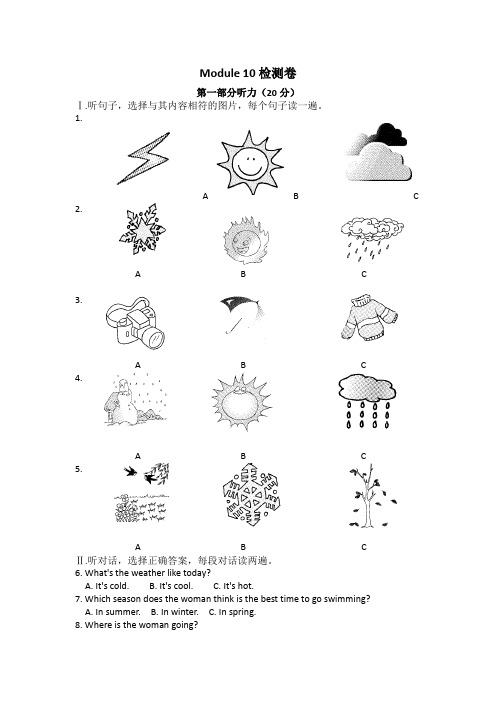
Module 10检测卷第一部分听力(20分)Ⅰ.听句子,选择与其内容相符的图片,每个句子读一遍。
1.A B C2.A B C3.A B C4.A B C5.A B CⅡ.听对话,选择正确答案,每段对话读两遍。
6. What's the weather like today?A. It's cold.B. It's cool.C. It's hot.7. Which season does the woman think is the best time to go swimming?A. In summer.B. In winter.C. In spring.8. Where is the woman going?A. To the park.B. To the zoo.C. To the school.9. What are they talking about?A. A film.B. The weather.C. A trip.10. Why will the woman stay at home tomorrow?A. Because she wants to read a book.B. Because she likes to stay at home.C. Because it will probably rain.Ⅲ.听长对话,选择正确答案,每段对话读两遍。
听第一段材料,回答第11-12题。
11. Where will Lucy go?A. To Liaocheng.B. To Weihai.C. To Binzhou.12. How does Lucy know the weather?A. On TV.B. On the radio.C. On the newspaper.听第二段材料,回答第13-15题。
13. What's the weather like in Hangzhou now?A. Very warm.B. Very cold.C. Very hot.14. Did Wang Fang go to Hangzhou?A. Yes.B. No.C. We don't know.15. Where will they read stories about Hangzhou?A. On the radio.B. On TV.C. On the Internet.Ⅳ.听短文,选择正确答案,短文读两遍。
最新版2019-2020年外研版八年级英语上册Module8模块综合检测及答案-精编试题
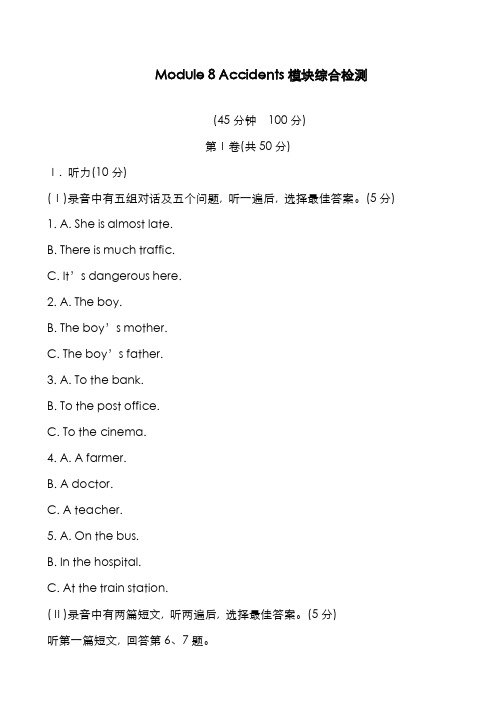
Module 8 Accidents模块综合检测(45分钟100分)第Ⅰ卷(共50分)Ⅰ. 听力(10分)(Ⅰ)录音中有五组对话及五个问题, 听一遍后, 选择最佳答案。
(5分)1. A. She is almost late.B. There is much traffic.C. It’s dangerous here.2. A. The boy.B. The boy’s mother.C. The boy’s father.3. A. To the bank.B. To the post office.C. To the cinema.4. A. A farmer.B. A doctor.C. A teacher.5. A. On the bus.B. In the hospital.C. At the train station.(Ⅱ)录音中有两篇短文, 听两遍后, 选择最佳答案。
(5分)听第一篇短文, 回答第6、7题。
6. How many children under the age of 16 die or get hurt on roads in the UK every year according to the passage? 4A. About 1, 500.B. About 5, 000.C. About 5, 500.7. Why do boys have more accidents than girls?A. Because girls do more housework than boys.B. Because boys play more outdoor games.C. Because boys spend more time on computer games than girls.听第二篇短文, 回答第8~10题。
8. How many years has Sally been driving?A. For two years.B. For three years.C. For four years.9. How does Jack drive?A. He drives badly.B. He only has an accident.C. He drives carefully.10. Who was wrong in yesterday’s accident?A. Sally.B. Sally’s husband.C. The tree.Ⅱ. 单项选择(10分)1. A dog bit him and he was ________ great pain.A. inB. withC. atD. on2. —My pen is on the floor. Can you help me________? 【:】—Sure, I’m glad to do that.A. pick up itB. get up itC. pick it upD. get it up3. The boy ran quickly and soon disappeared ________ the corner.A. atB. inC. fromD. round4. —Hello, you look tired today.—Yes, I slept too late yesterday evening. I ________my homework. A. was doing B. didC. have doneD. had done5. Brian was sleeping ________ his mother was telling a story. 【:21 0】A. untilB. whileC. beforeD. after6. I was tired and I ________ down for a while.A. liedB. lainC. layD. lying7.—The light is changing ________ red, Let’s wait ________ the road. —That’s right.A. to; acrossB. into; crossedC. from; crossingD. to; to cross8. Lucy will go to Beijing ________ the school term ends.A. in order toB. as soon asC. so thatD. even though9. —Would you like ________ to eat, Sally?—No, thanks. I’m full now.A. else nothingB. nothing elseC. something elseD. else something10. —Thank you for the present you sent me. It’s so nice. 21—________.A. No, thanksB. I’m glad you like itC. Please don’t say soD. No, it isn’t so goodⅢ. 完形填空(20分)Early one morning, an old woman was carrying a big basket of cabbages(卷心菜)to the market. She hoped to 1 them to the people from town.The mountain road was narrow(狭窄的)and the old woman was walking 2 , because she did not want to have 3 and lose her cabbages.Suddenly she 4 a loud bell and a bicycle came round the corner. It passed her and went very fast 5 the hill. The old woman had to jump up to one side of the 6 so quickly that the basket of cabbages nearly fell into the valley(山谷).She looked up, and saw that a young boy was on the bicycle. He was 7 on without even looking round to see 8 the old woman was all right.The old woman began to shout, “Come back, young man! You dropped something! ”When he heard this, the boy stopped the bicycle so suddenly thathe 9 fell off his bicycle. Then he turned and began to 10 the bicycle back up to the hill. “What is it? ”he asked, “What did I drop? ”“Little boy, ”the old woman answered, “you droppe d your manners. ”1. A. send B. sell C. give D. take2. A. carefully B. clearly C. politely D. hardly3. A. a match B. a restC. an accidentD. a talk4. A. hit B. made C. found D. heard5. A. over B. up C. to D. down6. A. road B. street C. town D. hill7. A. driving B. riding C. running D. walking8. A. how B. why C. whether D. when9. A. usually B. hardly C. easily D. nearly10. A. carry B. catch C. push D. giveⅣ. 阅读理解(10分)A taxi hit a truck. A policeman spoke to the taxi driver and the truck driver. He also spoke to Tom, a witness. This is what they said. 21 Truck driver: I was driving from the airport to Newton. A car crossed the road, so I slowed down. I didn’t stop. A ta xi hit the back of my truck. Nobody was seriously hurt but both cars were damaged.Taxi driver: I was driving behind a truck a few kilometres from Newton. The truck stopped suddenly without giving me a warning. Iwas driving very slowly. I couldn’t pass th e truck because there were two cars crossing near from Newton. My taxi hit the truck, and some glass cut my left hand.Tom: I witnessed the accident. The truck was going to Newton. It was not going very quickly. There was a taxi about two hundred metres behind the truck. It was going fast. When the truck slowed down, the taxi hit it. The driver was not looking at the truck. He was looking out of the window at something. My friend saw the accident, too.Tom’s friend spoke to the policeman and agreed with Tom. 21 011. How many people are mentioned(提到)in the story?A. Three.B. Four.C. Five.D. Six.2. The truck was hit on the way________.A. to the airportB. to the police stationC. homeD. to Newton3. From the story, we know ________ didn’t tell the truth. 2A. the bus driverB. the taxi driverC. TomD. Tom’s friend4. In fact, Tom’s friend was also a________.A. driverB. witnessC. policemanD. cleaner5. Which of the following sentences is WRONG?A. Nobody was hurt.B. There were two witnesses.C. Both cars were damaged.D. The taxi was driving very fast.第Ⅱ卷(共50分)Ⅴ. 词汇运用(20分)(Ⅰ)根据句意及首字母或汉语提示完成单词。
中考英语外研版教材单词语境分册练习八年级(上) Modules 5-6
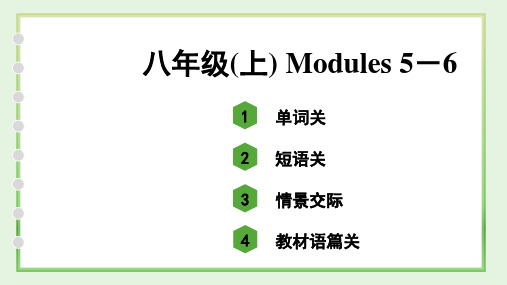
兼类词 15. end(v.)结束;终 →e_n_d_i_n_g___ (n.)结尾;结局 4 次 (n.)(时间的)最后一段,末尾 ★at__th_e__e_n_d__o_f __ 在……末尾,结束
16. act(v.)扮演→a_c_t_o_r____ (n.)(男)演员 →ac_t_r_e_s_s___ (n.)女演员 →ac_t_io__n____ (n.)举止;行为;情节 →ac_t_iv_i_t_y___ (n.)活动;行动 11 次 →ac_t_iv_e_____ (adj.)积极的;活跃的 ★ta_k_e_a_c_t_io_n_(_s_)__ 采取行动 (n.)(戏剧、歌剧或芭蕾舞的)一幕
8. grow(v.)(逐渐)变得;生长;增长;增大;种植;栽培(植物) →g_r_e_w_____(过去式) →g_r_o_w_n____(过去分词) →g_r_o_w_t_h___ (n.)生长;增长 ★g_r_o_w__u_p______ 长大;成熟;成长
9. raise(v.)筹集(钱款);抚养;养育 →r_a_is_e_d____(过去式/过去分词) →r_a_is_i_n_g___(现在分词) ★r_a_is_e_m__o_n_e_y___ 筹钱 10. produce (v.)生育;繁殖 →pr_o_d_u_c_e_d__ (过去式/过去分词)
5. science(n.)科学;科学课 →sc_ie_n_t_i_fi_c__ (adj.)科学的;系统的 →sc_i_en__ti_s_t__ (n.)科学家
动词
6. describe(v.)描写;描述d→es_c_ri_p_t_io_n____ (n.) 7. protect(v.)保护,保卫p→ro_t_e_c_t_io_n____ (n.) ★pr_o_te_c_t_s_t_h_._a_g_a_i_n_s_t_/f_r_o_m__s_th__. ____ 保护……免遭……;使……不受……
八年级上册英语外研版单词

八年级上册英语外研版单词Module 11、pair [pe] n.(相关的)两个人,一对。
2、correct [k'rekt] v.改正;纠正。
adj.正确的对的;3、spelling ['spel] n.拼写,拼字4、word [w:d] n.单词字词5、practise ['prkts] v.练习,6、match [mt] v.找到与相配之物,使成对,使相配7、meaning ['mi:n] n.意义;意思8、complete [km'pli:t] v把...填完整:使完全。
9、sentence ['sentns] n.句子10、dictionary ['dknri] n.字典词典11、grammar ['grm] n.语法12、letter ['let] n.信;字母13、look up查,查找14、mistake [m'stek] n.错误,过错15、make a mistake犯错误16、understand [,nd'stnd] v.(understood [,nd'stud])理解明白17、advice [d'vas] n.建议;意见18、should [ud] v.aux.应该19、possible ['psbl] adj.可能的20、write down写下记下21、notebook ['nt,bk] n.笔记本22、forget [f'get] v.(forgot [f'got]) 忘,忘记23、pronounce [pr'nans] v.发..的音24、aloud ['lad] adv.大声地出声地25、radio / 'redi / n.电台;广播26、pronunciation / pr,nnsi'en / n.发音27、key / ki: / adj.关键性的,非常重要的28、main / men / adj.主要的;最大的29、excellent / 'ekslnt / adj.极好的;优秀的30、agree / 'gri: / v.赞同agree with sb.同意某人31、vocabulary / vu'kbjulri / n.词汇;词汇量32、ask for 请求(给予)33、improve / m'pru:v / v.改进;改善34、basic / 'besk / adj.主要的;基础的35、time / tam / n.次;回36、advise / d'vaz / v.向···提出意见;忠告;建议37、shy / a / adj.羞怯的;腼腆的38、conversation / ,knv'sen / n.谈话;交谈39、quickly / 'kwkli / adv.快地;迅速地40、natural / 'ntrl / adj.合理的;合乎常情的41、suggest / s'dest / v.建议;提议42、place / ples / v.放置Module 21、hill / hl / n.小山;小丘2、population / ,ppj'len / n.(某一地区的)人口,全体居民3、wide / wad / adj.宽的;宽阔的4、million / 'mljn / num.百万5、pretty / 'prti / adv.[主口]相当地;非常;很pretty good 相当好;很好6、than / n; n / prep.比7、get / get / v.变成;成为8、north / n:θ / n.北;北方adj.在北方的;朝北的9、south / saθ / n.南;南方adj.在南方的;朝南的10、west / west / n.西;西方adj.在西方的;朝西的11、home town故乡;家乡12、especially / 'speli / adv.尤其13、be famous for 因······而闻名14、university / ,ju:n'v:sti / n.大学15、island / 'alnd / n.岛;岛屿16、area / 'eri / n.地区;区域17、low / l / adj.矮的;低的18、mountain / 'mantn / n.山;山岳18、countryside / 'kntri,sad / n.农村地区;乡下20、umbrella / m'brel / n.雨伞Module 31、baseball / 'bes,b:l / n.棒球2、volleyball / 'vli,b:l / n.排球3、boring / 'b:r / adj.烦人的;无聊的4、exciting / k'sat / adj.令人激动的;使人兴奋的5、relaxing / r'lks / adj.令人愉悦的;使人放松的6、score / sk: / v.(体育比赛中)得(分)7、already / :l'redi / adv.已经;早已8、matter / 'mt / n.问题;麻烦What's the matter?怎么了?9、hurt / h:t / v.(hurt / h:t / )(使)疼痛;(使)受伤10、enjoyable / n'dbl / adj.令人愉快的;有乐趣的11、Olympics / 'lmpks / n.奥林匹克运动会12、stadium / 'stedim / n.体育场13、miss / ms / v.未击中;未达到14、mind / mand / v.介意;讨厌;反对15、plenty / 'plenti / pron.大量;众多plenty of 大量;众多16、beat / bi:t / v.(beat / bi:t / )打败;战胜17、careless / 'kels / adj.粗心的;疏忽的18、cheer...on用欢呼声激励;为······加油19、coach / kt / n.教练20、fan club球迷(或影迷、歌迷)俱乐部21、against / 'genst / prep.(在比赛或战斗中)对(某人或某事物)22、train / tren / v.(体育)训练,操练23、practice / 'prkts / n.练习24、warm / w:m / v.使暖和;使温暖warm up热身;做准备活动25、usual / 'ju:l / adj.通常的;平常的26、better / 'bet / adv.更好地adj.更好的27、after-school / 'ɑ:ft,sku:l / adj.下午放学后的;课外的28、pleased / pli:zd / adj.开心的;满足的29、pass / pɑ:s / v.传递;传送30、pity / 'pti / n.可惜;遗憾31、chance / tɑ:ns / n.可能性;机会32、loudly / 'ladli / adv.响亮地;大声地33、confident / 'knfdnt / adj.自信的Module 41、road / rd / n.路;(尤指)公路2、accident / 'ksdnt / n.交通事故;意外事件3、except / k'sept / prep.除······之外4、choice / ts / n.选择5、classmate / 'klɑ:s,met / n.同班同学6、far / fɑ: / adv.远;遥远adj.远的;遥远的far from 远离7、close / kls / adj.(距离上)近的,接近的adv.(距离上)接近地8、crowded / 'kradd / adj.拥挤的;人数过多的9、all the time 一直;不断地10、journey / 'd:ni / n.旅行;旅程11、book / bk / v.预订12、park / pɑ:k / v.停放(车);泊(车)13、outside / at'sad / prep.在·····之外adv.在外面;朝户外n.外面;外部adj.外部的;外表的14、however / ha'ev / adv.然而;但是15、cost / kst / v.(cost / kst / )价钱为;花费n.价钱;成本;代价Module 51、actress / 'ktrs / n.女演员2、teahouse / 'ti:,has / n.(尤指亚洲的)茶馆3、offer / 'f / v.提议;提出4、end / end / n.(时间的)最后一段,末尾v.结束in the end 最后;终于5、no idea 不知道6、act / kt / n.(戏剧、歌剧或芭蕾舞的)一幕7、show / / v.展示;显示n.演出;表演8、common / kmn / adj.普通的;一般的9、twentieth / 'twentiθ / num.第二十10、describe / d'skrab / v.描写;描述11、society / s'sati / n.社会12、head teacher 校长13、college / 'kld / n.大学;学院14、novel / 'nvl / n.(长篇)小说15、name / nem / v.给……取名;给……命名16、if / f / conj.如果;若17、magic / 'mdk / adj.魔术的;戏法的Module 61、snake / snek / n.蛇2、neck / nek / n.颈;脖子3、thin / θn / a dj.薄的;细长的4、danger / 'dend / n.危险;危害5、in danger 处于危险中6、at last终于;最后7、interested / 'ntrstd / adj.关心的;感兴趣的8、allow / 'la / v.允许;准许9、think of想到;想出10、protect / pr'tekt / v.保护;保卫11、wild / wald / adj.野生的n.野生环境12、grow / gr / v.(grew / gru: / )(逐渐)变得;生长13、take away 夺去;拿走14、enough / 'nf / adj.足够的;充分的15、peace / pi:s / n.和平;太平16、in peace 和平地;平静地17、notice / 'nts / n.布告;告示18、look after照顾;照管19、raise / rez / v.筹集(钱款);抚养;养育20、research / r's:t;ri:s:t / n.研究;探讨21、baby / 'bebi / n.婴儿;婴孩22、situation / ,stu'en / n.形势;情况23、scientist / 'santst / n.科学家24、produce / pr'dju:s / v.生育;繁殖25、southwest / ,sauθ'west / n.西南adj.西南的;朝西南的26、in order to 为了27、government / 'gvnmnt / n.政府28、set / set / v.设置;设定set up开办;设立;创办;建立29、nature / 'net / n.大自然;自然界nature park 自然公园30、develop / d'velp / v.研制;制定31、feed / fi:d / v.(fed / fed / )喂养;饲养32、symbol / 'smbl / n.象征;标志Module 71、fall / f:l / v.(fell / fel / )下落;跌落2、follow / 'fl / v.跟随;紧跟3、hole / hl / n.洞;孔;穴4、rabbit / 'rbt / n.兔;家兔5、ssh / / int.嘘(示意某人不要说话)6、ground / grand / n.地面7、tea party 茶会8、twice / twas / adv.两次;两倍once or twice 偶尔;一两次,9、suddenly / 'sdnli / adv.突然地;出乎意料地10、pink / pk / adj.粉红色的;n.粉红色11、pocket / 'pkt / n.衣袋;口袋12、field / fi:ld / n.牧场;田地13、think about考虑14、deep / di:p / adj.(从顶部向下)深的15、while / wal / conj.当……的时候16、land / lnd / v.降落(或跳落、跌落)到地面(或水面上)17、dry / dra / adj.干的;干燥的Module 81、pale / pel / adj.(肤色)苍白的2、appear / 'p / v.出现;显露3、round / rand / prep.转到(某物的)另一边4、corner / 'k:n / n.拐角;街角5、hit / ht / v.(hit / ht / )(使)碰撞6、glad / gld / adj.高兴的;欢喜的7、in time 及时8、fall off...从……跌落9、risk / rsk / n.危险;风险10、attention / 'tenn / n.注意力pay attention 注意;留心11、side / sad / n.(物体或形状的)侧面side by side并排地;肩并肩地12、bite / bat / v.(bit / bt / )咬;叮13、climb / klam / v.爬;攀爬14、hide / had / v.(hid / hd / )躲;躲藏15、throw / θr / v.(threw / θru: / )扔;掷16、fridge / frd / n.冰箱17、pain / pen / n.痛;疼痛18、worse / w:s / adj.更糟的;更坏的; adv.更糟;更严重19、medicine / 'medsn / n.药;药物Module 91、noise / nz / n.噪音;杂音2、prepare / pr'pe / v.准备;预备3、notes / nts / n.(pl.)笔记;随笔4、report / rp:t / 报告;汇报5、grow / gr / v.(grew / gru: / )增长;增大6、huge / hju:d / adj.巨大的;庞大的7、cause / k:z / v.造成;引起8、problem / 'prblm / n.麻烦;问题9、increase / 'kri:s / n.增大;增长/n'kri:s / v.增大;增长10、birth / b:θ / n.出生11、billion / 'bljn / num.十亿12、fifth / ffθ / num.第五;五分之一13、hang on[口]稍等14、flat / flt / n.套房;公寓15、rubbish / 'rb / n.垃圾;废弃物16、quiet / 'kwat / adj.寂静的;安静的17、local / 'lkl / adj.当地的;本地的18、close down(永久)关闭,关停19、pupil / 'pju:pl / n.学生;(尤指)小学生20、pollution / p'lu:n / n.污染21、public / 'pblk / adj.公共的;公众的22、service / 's:vs / n.公共服务;服务23、solve / 'slv / v.解决问题Module 101、cloud / klad / n.云;云雾2、shower / 'a / n.阵雨3、snow / sn / n.雪v.下雪4、storm / st:m / n.暴风雨5、cloudy / 'kladi / adj.多云的6、rainy / 'reni / adj.多雨的;下雨的7、snowy / 'sni / adj.多雪的;下雪的8、sunny / 'sni / adj.晴朗的9、windy / 'wndi / adj.多风的;刮大风的10、skate / sket / v.滑冰11、thick / θk / adj.厚的12、ice / as / n.冰13、joke / dk / v.说笑话;开玩笑n.笑话;玩笑14、might / mat / v.aux.可能;也许15、temperature / 'tempr,t / n.温度16、minus / 'mans / adj.负的;零下的17、degree / d'gri: / n.度;度数18、although / :l' / conj.然而;尽管19、wet / wet / adj.下雨的;湿的20、neither / 'na;'ni: / adv.(某人或某事物)也不21、terrible / 'terbl / adj.使人烦恼的;可怕的22、wish / w / v.但愿;希望23、probably / 'prbbli / adv.或许;可能24、come on快点25、mile / mal / n.英里26、round / rand / adv.围绕地27、north west / ,n:θ'west / n.西北;adj.西北的;朝西北的28、southeast / ,saθ'i:st / n.东南;adj.东南的;朝东南的29、from time to time有时;间或Module 111、cap / kp / n.(有檐的)帽子2、chess / tes / n.国际象棋3、set / set / n.(同类事物的)(一)套,(一)副,(一)组a chess set一副国际象棋4、chopstick / 'tp,stk / n.筷子5、toy / t / n.玩具6、video / 'vdi / adj.(电子)视频的video game 电子游戏7、gift / gft / n.礼物8、surprise / s'praz / n.惊奇;意外之事;v.使(某人)吃惊9、immediately / 'mi:ditli / adv.立刻;当即10、difference / 'dfrns / n.差别;差异11、accept / k'sept / v.收受;接受12、tradition / tr'dn / n.传统习俗13、example / g'zɑ:mpl / n.例子;实例for example 例如14、must / mst; mst / v.aux.必须;应该15、month / mnθ / n.月;月份16、serious / 'sris / adj.认真严肃的;不开玩笑的17、taste / test / v.有······的味道;n.味道;滋味18、experience / k'sprins / n.经历;经验19、stay / ste / n.逗留;停留20、someone / 'smwn / pron.某人;有人21、for the first time 首次;初次22、sandwich / 'sndwd / n.三明治;夹心面包片23、chip / tp / n.炸土豆条;炸薯条24、fish and chips 炸鱼加炸薯条25、onto / 'nt / prep.到……之上;向……之上26、gentleman / 'dentlmn / n.先生;男士27、shoulder / ld / n.肩;肩膀Module 121、broken / 'brkn / adj.破碎的2、glass / glɑ:s / n.玻璃3、stairs / stez / n.(pl.)楼梯4、aid / ed / n.救助;帮助first aid 急救5、medical / 'medkl / adj.医学的;医疗的6、imagine / 'mdn / v.想象,设想7、bottom / 'btm / n.底部;下端at the bottom of...在……的底部8、wrong / r / adj.有毛病的;错误的adv.不正确地;错误地9、What's wrong with...? ……怎么了?10、trouble / 'trbl / n.问题;烦恼;困难11、lift / lft / v.举起;抬起;提起n.电梯lift up抬起;提起12、harmful / 'hɑ:mfl / adj.有害的13、drop / drp / v.使落下;投下14、training / 'tren / n.训练;培训15、make sure 确保;确认16、cover / 'kv / v.盖;盖上17、earthquake / ':θ,kwek / n.地震18、warn / w:n / v.警告;告诫19、inside / 'n,sad / n.内部;里面adv.在里面;向室内prep.在……里面adj.里面的;内部的20、under / 'nd / prep.在……正下方;在……下面21、window / 'wnd / n.窗;窗户22、keep / ki:p / v.(kept / kept / )保持;留在23、clear / kl / adj.不和……接触的;不挨……太近的v.清除;清理;移走keep clear of...不和……接触24、calm / kɑ:m / adj.镇静的;沉着的25、brave / brev / adj.勇敢的;无畏的26、helpful / 'helpfl / adj.有用的;提供帮助的27、power / 'pau / n.电;电力。
外研版2019-2020学年八年级英语上册单词拼写、选词填空、语法填空(三)

单词拼写、选词填空、语法填空(三)A组一、单词拼写(2015·永康)根据短文内容和所给中文提示,写出空白处各单词的正确形式。
每空限填一词。
Health is very important for us. Can you look after your health? Do you have a 1 (健康的) habit? Do you know 2 (如何) to keep in good health? Here 3 (是;有) some advice for you. First, you need to have some good eating habits. You should eatfruit and vegetables four or five times a week. And you need to eat tofu or drink 4 (牛奶)every day. Oh, don’t forget to sleep 5 (九) hours every night. Having6 (足够的) sleep can help you feel much better. Doing some exercise is also necessary for you. We think the7 (最好的) way to relax is doing exercise. Itis healthy for the brain and the 8 (身体). Exercise such as playing sports isfun. But don’t 9 (使)yourself too tired. It’s important to 10 (保持)happy and be friendly to others. I’m sure you can be strong.二、选词填空(2015·永康)用方框中所给单词的适当形式填空。
2019秋外研版八年级英语上册训练:Module 3 Sports Unit 1 Nothing is more enjoyable than playing tennis
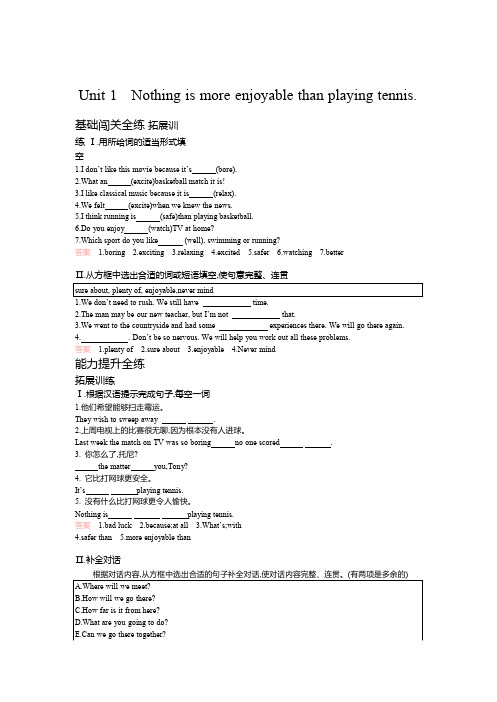
Unit 1 Nothing is more enjoyable than playing tennis. 基础闯关全练拓展训练Ⅰ.用所给词的适当形式填空1.I don’t like this movie because it’s (bore).2.What an (excite)basketball match it is!3.I like classical music because it is (relax).4.We felt (excite)when we knew the news.5.I think running is (safe)than playing basketball.6.Do you enjoy (watch)TV at home?7.Which sport do you like (well), swimming or running?答案 1.boring 2.exciting 3.relaxing 4.excited 5.safer 6.watching 7.betterⅡ.从方框中选出合适的词或短语填空,使句意完整、连贯sure about, plenty of, enjoyable,never mind1.We don’t need to rush. We still have time.2.The man may be our new teacher, but I’m not that.3.We went to the countryside and had some experiences there. We will go there again.4. . Don’t be so nervous. We will help you work out all these problems.答案 1.plenty of 2.sure about 3.enjoyable 4.Never mind能力提升全练拓展训练Ⅰ.根据汉语提示完成句子,每空一词1.他们希望能够扫走霉运。
中考英语外研版知识点分册总复习八年级(上) Modules 1-2

minutes).[2019 江西阅读 A]____C___B.adj. (数量等)减少的
C.adj. 低声的
D.n. 低点
③You speak in such a low voice that people can hardly hear you. [2019 绥
化阅读 B] ____C____
④Look! The plane is flying low over the town. ___A___
homewor k. ___B___
3.key(2020 阅读 C 涉及) ►熟义:①___关__键__性__的__;__非__常__重__要__的____ (adj.) ►全国其他教材词义: ②In our room, my books and tapes are in the bookcase. My keys are in my schoolbag. [人教七(上) Unit 4 P23] __钥__匙____ (n.) ③A sense of humor is really one of the keys to happiness. [2020 北部湾经 济区阅读 C;冀教]__关__键____(n.)
time.
A.studied
B.study
C.to study
D.studying
13.It's _d_a_n_g_e_r_o_u_s__(danger) for us to answer phones while crossing the street.
of for 14.It is necessary ___f_o_r___ everyone to develop a good habit of reading. 15.It's very kind ____o_f___ you to lend me your dictionary in class.
外研版八年级上册 Module4 知识点总结+练习 (无答案)

Module 4 Planes, ships and trains1. What happened?发生了什么?happen是不及物动词,意为“发生”。
用法见下表:it, what, this, that, something等充当。
如果表示事先安排或有准备的事件的发生,则用take place。
happen 为短暂性动词,不能与表示一段时间的状语连用。
【中考链接】根据汉语提示完成句子(2018连云港中考)---Have you met Luke recently ?---Yes , I _____________________(碰巧看见他)in the science museum yesterday afternoon .2. But nobody was late ,except me .except 介词:除……之外except表示从所提到的人或事物中除去,即从整体中除去一部分。
该词和but用法相似。
如:I don’t want anything except this one.除了这个,我什么都不想要。
【辨析】except, except for, besides与butWe would go for a picnic except for the bad weather .要不是这糟糕的天气,我们就去野餐了。
【中考链接】(2019淮安模拟)---The Spring Festival is coming. All the workers went home yesterday _________ Mr .Green. Do you know why he didn’t go home ?---Sure .Because he was on duty .A. exceptB. besidesC. except for3. Maybe I should go to school by taxi.或许我应该坐出租车去学校。
新外研版八年级英语上册单词表默写(带音标)英翻中 -
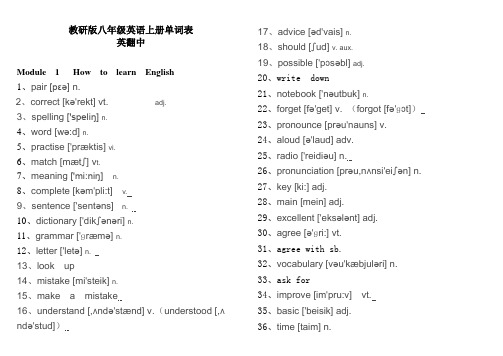
教研版八年级英语上册单词表英翻中Module 1 How to learn English1、pair [pεə] n.2、correct [kə'rekt] vt.adj.3、spelling ['speliŋ]n.4、word [wə:d] n.5、practise ['præktis] vi.6、match [mætʃ] v t.7、meaning ['mi:niŋ]n.8、complete [kəm'pli:t] v.9、sentence ['sentəns] n.10、dictionary ['dikʃənəri] n.11、grammar ['ɡræmə] n.12、letter ['letə] n.13、look up14、mistake [mi'steik] n.15、make a mistake16、understand [,ʌndə'stænd] v.(understood [,ʌndə'stud])17、advice [əd'vais] n.18、should [ʃud] v. aux.19、possible ['pɔsəbl] adj.20、write down21、notebook ['nəutbuk] n.22、forget [fə'get] v. (forgot [fə'ɡɔt])23、pronounce [prəu'nauns] v.24、aloud [ə'laud] adv.25、radio ['reidiəu] n.26、pronunciation [prəu,nʌnsi'eiʃən] n.27、key [ki:] adj.28、main [mein] adj.29、excellent ['eksələnt] adj.30、agree [ə'ɡri:] vt.31、agree with sb.32、vocabulary [vəu'kæbjuləri] n.33、ask for34、improve [im'pru:v] vt.35、basic ['beisik] adj.36、time [taim] n.37、advise [əd'vaiz] vt.38、shy [ʃai] adj.39、conversation [,kɔnvə'seiʃən] n.40、quickly ['kwikli] adv.41、natural ['nætʃərəl] adj.42、suggest [sə'dʒest] vt.43、place [pleis] vt.Module 2 My home town and my country1、hill [hil] n. 小山;小丘2、population [,pɔpju'leiʃən] n.3、wide [waid] adj.4、million ['miljən] num.5、pretty ['priti] adv.6、pretty good7、than [ðæn, 弱ðən] prep.8、get [ɡet] vi.9、north [nɔ:θ] n. ;adj.10、south [sauθ, sauð] n. ;adj.11、west [west] n.adj.12、home town 13、especially [i'speʃəli] adv.14、be famous for15、university [,ju:ni'və:səti] n.16、island ['ailənd] n.17、area ['εəriə] n.18、low [ləu] adj.19、mountain [`mauntin] n.20、countryside ['kʌntri,said] n.21、umbrella [ʌm'brelə] n.Module 3 Sports x K b1.C om1、baseball ['beisbɔ:l] n.2、volleyball ['vɔlibɔ:l] n.3、boring ['bɔ:riŋ] adj.4、exciting [ik'saitiŋ] adj.5、relaxing [ri'læksiŋ] adj.6、score [skɔ:] vi.7、already [ɔ:l'redi] adv.8、matter ['mætə] n.9、What`s the matter10、hurt [hə:t] vt.11、enjoyable [in'dʒɔiəbl] adj.12、Olympics [əu'limpiks] n.13、stadium ['steidiəm] n.14、miss [mis] v.15、mind [maind] v. vt.16、plenty ['plenti] pron.17、plenty of18、beat [bi:t] vi.19、careless ['kεəlis] adj.20、cheer…on21、coach [kəutʃ] n.22、fan club23、against [ə'ɡenst] prep.24、train [trein] v.25、practice ['præktis] n.26、warm [wɔ:m] vt.27、warm up28、usual ['ju:ʒuəl] adj.29、better [betə] adv. ;adj. 30、after-school ['æftəskʊl] adj.31、pleased [pli:zd] adj.32、pass [pɑ:s, pæs] vi.33、pity ['piti] n.34、chance [tʃɑ:ns] n.35、loudly ['laudli] adv.36、confident ['kɔnfidənt] adj.Module 4 Planes, ships and trains X| k |B| 1 . c |O |m1、road [rəud] n.2、accident ['æksidənt] n.3、except [ik'sept] prep.4、choice [tʃɔis] n.5、classmate ['klɑ:smeit] n.6、far [fɑ:] adv. adj.7、far from8、close [kləuz] adj.9、crowded ['kraudid] adj.10、all the time11、journey ['dʒə:ni] n.12、book [buk] vt.13、park [pɑ:k] vt.14、outside [,aut'said] prep.adv. ;adj.15、however [hau'evə] adv.16、cost [kɔst] vt.n. Module 5 Lao She Teahouse1、actress ['æktris] n.2、teahouse ['ti:haus] n.3、offer [ɔfə] v.4、end [end] n. V.5、in the end6、no idea7、act [ækt] n.8、show [ʃəu] vt.;n.9、common ['kɔmən] adj.10、twentieth ['twentiiθ] num.11、describe [di'skraib] vt.12、society [sə'saiəti] n.13、head teacher14、college ['kɔlidʒ] n. 15、novel ['nɔvəl] n.16、name [neim] v.17、if [if] conj.18、magic ['mædʒik] adj.Module 6 Animals in danger1、snake [sneik] n.2、neck [nek] n.3、thin [θin] adj.4、danger ['deindʒə] n.5、in danger6、at last7、interested ['intristid] adj.8、allow [ə'lau] vt.9、think of10、protect [prəu'tekt] vt.11、wild [waild] adj. n.12、grow [ɡrəu] v. grew [ɡru:]13、take away14、enough [i'nʌf] adj.15、peace [pi:s] n.16、in peace17、notice ['nəutis] n.18、look after19、raise [reiz] vt.20、research [ri'sə:tʃ] n.21、baby ['beibi] n.22、situation [,sitju'eiʃən] n.23、scientist ['saiəntist] n.24、produce [prə'dju:s] vt.25、southwest [,sauθ'west] n.26、in order to27、government ['ɡʌvənmənt] n.28、set [set] v.29、set up30、nature ['neitʃə] n.31、nature park32、develop [di'veləp] v.33、feed [fi:d] vt. (fed [fed])34、symbol ['simbəl] n. Module 7 A famous story1、fall [fɔ:l] vi.2、follow ['fɔləu] vt.3、hole [həul] n.4、rabbit ['ræbit] n.5、ssh [ʃ] int.6、ground [ɡraund] n.7、tea party8、twice [twais] adv.9、once or twice10、suddenly ['sʌdnli] adv.11、pink [piŋk] adj. n.12、pocket ['pɔkit] n.13、field ['fi:ld] n.14、think about15、deep [di:p] adj.16、while [hwail] conj.17、land [lænd] v.18、dry [drai] adj.Module 8 Accidents1、pale [peil] adj.2、appear [ə'piə] vi.3、round [raund] prep.4、corner ['kɔ:nə] n.5、hit [hit] vt.6、glad [ɡlæd] adj.7、in time8、fall off…9、risk [risk] n.10、attention [ə'tenʃən] n.11、pay attention12、side [said] n.13、side by side14、bite [bait] vt.(bi[biti])15、climb [klaim] vi.16、hide [haid] v.(hid[hid])17、throw [θrəu] vt.18、fridge [fridʒ] n.19、pain [pein] n. 20、worse [wə:s] adj.adv.21、medicine ['medisin] n.Module 9 Population1、noise [nɔiz] n.2、prepare [pri'pεə] vt.3、notes [nəʊts] n.(pl)4、report [ri'pɔ:t] n.5、grow [ɡrəu] v.( grew [ɡru:])6、huge [hju:dʒ] adj.7、cause [kɔ:z] vt.8、problem ['prɔbləm] n.9、increase ['inkri:s] n.increase [in'kri:s] v.10、birth [bɑ:θ] n.11、billion ['biljən] num.12、fifth [fifθ] num.13、hand on (口)14、flat [flæt] n.15、rubbish ['rʌbiʃ] n.16、quiet ['kwaiət] adj.17、local ['ləukəl] adj.18、pupil ['pjupl] n.19、pollution [pə:'lju:ʃən] n.20、public ['pʌblik] adj.21、service ['sə:vis] n.22、solve [sɔlv] v.Module 10 The weather1、cloud [klaud] n.云;云雾2、shower ['ʃauə] v. 阵雨3、snow [snəu] n. 雪;v.下雪4、storm [stɔ:m] n. 暴风雨;5、cloudy ['klaudi] adj. 多云的6、rainy ['reini] adj. 下雨的;多雨的7、snowy ['snəui] adj. 下雪的,多雪的8、sunny ['sʌni] adj.晴朗的9、windy ['windi] adj.多风的,刮大风的10、skate [skeit] vi. 滑冰11、thick [θik] adj. 厚的12、ice [[ais]] n.13、joke [dʒəuk] vi.n. 14、might [mait] v. aux.15、temperature ['tempəritʃə] n.16、minus ['mainəs] adj.17、degree [di'ɡri:] n.18、although [ɔ:l'ðəu] conj.19、wet [wet] adj.20、neither ['naiðə, 'ni: ðə] adv.21、terrible ['terəbl] adj.22、wish [wiʃ] v.23、probably ['prɔbəbli] adv.24、come on25、mile [mail] n.26、round [raund] adv.27、northwest [,nɔ:θ'west] n. adj.28、southeast [,sauθ'i:st] n. adj.29、from time to timeModule 11 Way of life1、cap [kæp] n.2、chess [tʃes] n.3、set [sɛt] n.4、a chess set5、chopsticks ['tʃɒpstɪks] n.6、toy [tɔi] n.7、video ['vidiəu] adj.8、video game9、gift [ɡift] n.10、surprise [sə'praiz] n.V.11、immediately [i'mi:diətli] adv.12、difference ['difərəns] n.13、accept [ək'sept] v.14、tradition [trə'diʃən] n.15、example [iɡ'zɑ:mpl] n.16、for example17、must [mʌst, 弱məst] v. aux.18、month [mʌnθ] n.19、serious ['siəriəs] adj.20、taste [teist] v. ;n.21、experience [ik'spiəriəns] n.22、stay [stei] n.23、someone ['sʌmwʌn] pron.24、for the first time25、sandwich ['sænwidʒ] n.26、chip [tʃip] n.27、fish and chips28、onto ['ɔntu] prep.29、gentleman ['dʒentlmən] n .30、shoulder ['ʃəuldə] n.Module 12 Help1、broken ['brəukən] adj.2、glass [ɡlɑ:s] n.3、stairs [steəz] n.(stair的复数)4、aid [eid] n.5、first aid6、medical ['medikəl] adj.7、imagine [i'mædʒin] vi.8、bottom ['bɔtəm] n.9、at the bottom of …10、wrong [rɔŋ]adj. adv.11、What`s wrong with…?12、trouble ['trʌbl] n.13、lift [lift] v. n.14、lift up15、harmful ['hɑ:mful] adj.16、drop [drɔp] vt.17、training ['treiniŋ] n.18、make sure19、cover ['kʌvə] v.20、earthquake ['ə:θkweik] n.21、warn [wɔ:n] vt.22、inside ['in.said] n. ;adv .;prep . adj.23、under ['ʌndə] prep.24、window ['windəu] n.25、keep [ki:p] vt.(kept [kept])26、clear [kliə] adj.27、keep clear of …28、calm [kɑ:m] adj.29、brave [breiv] adj.30、helpful ['helpful] adj.31、power [pauə] n.。
外研版2019-2020学年八年级英语上册单词拼写、选词填空、语法填空(一)

单词拼写、选词填空、语法填空(一)A组一、单词拼写(2015·金华市婺城区)根据短文内容和所给中文提示,写出空白处各单词的正确形式。
每空限填一词。
David is only sixteen years old, but he is 1 (已经) a famous baseball playerin his home town. David’s father liked baseball very much, so he asked David to 2 (训练) when David was still a young child. David also thinks that the baseball game isvery 3 (令人兴奋的).David is famous because he helped his school team win the high school baseball state championship(州冠军) last year. Now David is the 4 (关键的) player in his schoolbaseball team, but he thinks there are still a lot of things he needs to do before becomingan 5 (优秀的) baseball player. He practises very 6(努力地) every day, because he believes that the more he does, the 7 (更好的) he will become. When the 8 (教练) teaches them a new skill(技能), healways does it for many 9(次). Sometimes he thinks these practices are not 10 (足够的), so when he getshome, he will continue his practice until very late. David dreams of becoming a professional(专业的) baseball player in the future.二、选词填空(2015·金华市婺城区)用方框中所给单词或词组的适当形式填空。
外研版英语八年级上册各模块单词汇编填空练习

外研版英语八年级上册各模块单词汇编填空练习Module 11. ~__________(修改) your spellings in _________(成对) and __________(练习) matching the _________(单词) with their___________(意思).~OK, Miss Zhou.整句翻译:__________________________________________________ ______________________________________________________ _____2. ~I'm afraid I can't ___________(完成) the ___________(句子)with the first _________(字母) because I'm not good at__________(语法).~Don't worry. You can try to _________ ________(查询) the _________(单词) in the ___________(字典) first.整句翻译:__________________________________________________ ______________________________________________________ ______________________________________________________ ______________________________________________________ ______3. ~I don't __________(了解) the __________(句子). And I often make __________(毛病) in writing. Please give mesome_________(发起).~You should write down your __________(毛病) in the ___________(条记本), and don't _________(遗忘) towrite down the __________(精确的) answers next to them. Like this, it's __________(大概的) to write well.整句翻译:__________________________________________________ ______________________________________________________ ______________________________________________________ ______________________________________________________ ______4. ~ I can't ___________(发...音) new words well.~It's a good idea to listen to English radio. You can try to __________(发...音) the_________(关键的) words and ________(主要的) ___________(句子) aloud, then you will be good at ____________(发音).整句翻译:__________________________________________________ ______________________________________________________ ______________________________________________________ ______________________________________________________ ______5. ~How can I improve my writing?~___________(词汇) is _________(基础的) for English learning. You should askteachers orfriends for help when you meet problems.~___________(好极了). I _________ ________(同意) you.整句翻译:__________________________________________________ ______________________________________________________ ______________________________________________________ ______________________________________________________ ______6. ~I spell and pronounce new words many _________(次数) every day, but I still forget them __________(快).~It's ___________(自然的) to forget new words. I __________(建议) you use them in __________(对话), or _________(放置) word cards in your room.Don't be ________(害羞的), have a try.整句翻译:__________________________________________________ ______________________________________________________ ______________________________________________________ ______________________________________________________ ______Module 21.~How was your trip in Shenzhen?~__________ _________(非常好). It is in the _________(南方) of China, the ________(北方) ofHong Kong. Its streets are getting _________(宽) and cleaner than before, like many big cities in the _________(西方). __________(百万) of young people like to work there.整句翻译:__________________________________________________ ______________________________________________________ ______________________________________________________ ______________________________________________________ ______2.~I heard your __________ _________(故乡) is in a very beautiful _________(地区) with ________(低的) mountains. ~Yes, it's inthe ___________(乡间), part of an __________(岛). It's ___________(特别) famous for its university.整句翻译:__________________________________________________ ______________________________________________________ ____________________________________________________________________________________________________________ ______Module 31. ~The __________(棒球) match is too relaxing. What is the ________(比分)?~The red team _________(得分) a minute ago. But itis really _________(无聊的).I like watching a __________(排球) match, because it is more____________(令人兴奋的) .整句翻译:__________________________________________________ ______________________________________________________ ______________________________________________________ ______________________________________________________ ______2. ~What's the ________(问题) with you, Tony? ~Bad luck!I _________(错过) a ball and ________(受伤) my knee in the footballmatch.~_________ _________(不要紧). But I think watching __________(奥林匹克) games at a __________(体育馆) is safer andmore __________(愉快的) than playing it by yourself.整句翻译:__________________________________________________ ______________________________________________________ ____________________________________________________________________________________________________________ ______3. ~We really want to ________(打败) the blue team, but we were ___________(粗心的). ~_________ _________(不要紧). You stillhave _________ _______(充足的) time. Our ________(教练) and all the ________(球迷) will __________(喝彩) you on.整句翻译:__________________________________________________ ______________________________________________________ ______________________________________________________ ______________________________________________________ ______4. ~Next week, we will play __________(对着) the blue team. Our coach _________(锻炼) us harder than _________(寻常).~Ibelieve we can do _________(更好). We should have more time to _________ ________(热身) and do ________________(课后的)__________(操演).整句翻译:__________________________________________________ ______________________________________________________ ______________________________________________________ ____________________________________________________________5. ~Boys, I'm __________(满意的) with you. Be _________ ___________(更自傲). We have a _________(更好的) _________(机遇)of winning.~Yes,our fans cheer us on __________(高声地), so let's ________(通报) the ball more carefully. Don't have any_________(遗憾).整句翻译:__________________________________________________ ______________________________________________________ ______________________________________________________ ______________________________________________________ ______Module 41. ~Oh, Betty, you live ________ ________(靠近) school, your __________(同学) live ________ ________(远离) school, but nobodywas late _________(除了) you. What happened?~Sorry, there was a _________ _________(公路事故) on my way to school, sothe bus was very _________(拥挤的). I had no other _________(选择) but walk to school.整句翻译:__________________________________________________ ____________________________________________________________________________________________________________ ______________________________________________________ ______2. ~How was your_________(行程) from London to Paris?~It was wonderful ________ ________ ________(一直). I _________(预定) the ticket and hotel a long time before I travelled, it didn't ________(花费) too much. __________(然而), parking was expensive inParis, so stay __________(在外部) the city centre and travel in by bus.整句翻译:__________________________________________________ ______________________________________________________ ______________________________________________________ ______________________________________________________ ______Module 51 ~I heard Lingling _________(主动) to take you to Lao She Teahouse last night. What do you think of the ________(表演)?~I have ________ ________(不知道). ________ ________ _______(最终), I just remember the _________(女演员) was excellent.整句翻译:__________________________________________________ ______________________________________________________ ______________________________________________________ ______________________________________________________ ______2. ~After finishing school, Lao She became a _________ __________(校长) and then taught Chinese in a _________(大学) in England.~En, I know he wrote many _________(小说), for example, his Teahouse __________(描述) ________(普通的) people in Chinese__________(社会) in the ___________(第二十) century. So he was __________(被称为) "the People's Artist".整句翻译:__________________________________________________ ______________________________________________________ ______________________________________________________ ______________________________________________________ ______3. ~You can enjoy _________ _________(把戏节目) in Lao She Teahouse __________(假设) you visit Beijing.~I hope that.整句翻译:__________________________________________________ ____________________________________________________________________________________________________________ ______________________________________________________ ______Module 61. ~________ ________(最终), what do you ________ _______(认为)the giraffes?~I am __________(感兴趣) in them, becausethey _________(允许) us to get closer, and I like their long _________(脖子).~But do you know the _________(细长的)_________(蛇) are ________ ________(在危险中), we need to _________ _________ ________(保护野生动物).整句翻译:__________________________________________________ ______________________________________________________ ______________________________________________________ ______________________________________________________ ______2. ~Villages and farm s are __________(生长) bigger, they ________ ________(夺走) pandas' home, so they don't have _________(足够) bamboo to eat.~Yes, the _________(布告) says their __________(情况) is getting difficult. Let's _________(筹集) somemoney for _________(研究) centres to _________________(照顾) baby pandas and help them live ________ ________(平静地).整句翻译:__________________________________________________ ______________________________________________________ ______________________________________________________ ______________________________________________________ ______3. ~Pandas are the _________(标记) of China.~Yes,________ ________ _______ _________(为了保护) them, the _________(当局) is _________ ________(设立) more ________ ________(天然公园) to ________(豢养) pandas in the _________(西南), and___________(科学家) are ___________(制订) plans to help them _________(出产) more babies.整句翻译:__________________________________________________ ______________________________________________________ ______________________________________________________ ______________________________________________________ ______Module 71. ~Alice ________(追随) the rabbit and _________ ________(掉落) a _________(洞) in the _________(空中).~Whathappenednext?~She saw March hare and the Mad Hatter were having a ________ _________(茶会).整句翻译:__________________________________________________ ______________________________________________________ ______________________________________________________ ______________________________________________________ ______2. ~________ _______ ________(偶尔), Alice looked into her sister's book. __________(突然) a rabbit with _________(粉红的) eyesran by.~What did she _________ ________(认为) the rabbit?~She thought it was strange to see a rabbit take out a watch out ofits __________(口袋) __________(正当...时) it was running in the _________(田野).So you know, she _________ ________(掉落)a _________(深的) _________(洞) and _________(着陆) on some _________(干燥的) leaves.整句翻译:__________________________________________________ ______________________________________________________ ______________________________________________________ ______________________________________________________ ______Module 81. ~You look_________(惨白的), what happened?~I saw an accident. A car suddenly ___________(呈现) _________(转到) the__________(角落), but I am _________(镇静的) to say the car stopped ________ ________(实时) and it didn't ________(撞) the boy.整句翻译:__________________________________________________ ______________________________________________________ ______________________________________________________ ______________________________________________________ ______2. ~A boy________ ________(掉落) his bike _________(当...的时候) he was riding to school.~Don't ride ________ ______________ (肩并肩). We should ________ _________ _______(关注) the ________(风险) of accidents.整句翻译:__________________________________________________ ______________________________________________________ _____3. ~A snake _________ _______ _______(爬出来) the box and ________(潜藏) behind the __________(冰箱). Henry wanted to_________(扔) it out. Unluckily, the snake ________(咬) him.~Yes, he said the ________(痛苦悲伤) in his hand got_________(更锋利),so he hurried to the doctor and got the right __________(药).整句翻译:__________________________________________________ ______________________________________________________ ______________________________________________________ ______________________________________________________ ______Module 91. ~Are you __________(准备) some ________(笔记) for a _________(报告)?~Yes. It's about the ___________ __________(人口增长). The ________(巨大的) population _________(引起) many problems, such as too much _________(噪音), ________(垃圾) andtraffic.整句翻译:__________________________________________________ ______________________________________________________ ______________________________________________________ ______________________________________________________ ______2. ~China has the largest population, almost ________ ________(五分之一) of the world's population, that is, about 7_________(十亿). Chinese government has to build many _________(公寓) in the _________(宁静的) villages.~_________ _______(稍等) aminute, please. I'll write that down.整句翻译:__________________________________________________ ______________________________________________________ ______________________________________________________ ______________________________________________________ ______3. ~Because _________(学生) are fewer and fewer, the _________(当地) government ________ ________(关闭) the village schoollast year. But they have many other problems to __________(解决).~En, __________(污染) is serious, and people need better_________ _________(公共服务).整句翻译:__________________________________________________ ______________________________________________________ ______________________________________________________ ______________________________________________________ ______Module 101. ~What's the weather like in the north?~Now it is __________(多云的) and__________(有风的), it might be__________(下雨的) in the afternoon, but no__________(阵雨) or__________(风暴). Tomorrow it might be__________(下雪的). Then it willbe__________(晴天的).整句翻译:__________________________________________________ ______________________________________________________ ______________________________________________________ ______________________________________________________ ______2. ~Let's _________ __________(去滑冰) in the park because there is _________ _________(厚厚的冰) on the lake.~Are you__________(开玩笑)? The ___________(气温) is _________ ________ _________(零下八度). It's too cold. You_________ ________(最好) stay at home, __________(虽然) it is a good time to skate.整句翻译:__________________________________________________ ______________________________________________________ ____________________________________________________________________________________________________________ ______3. ~________ ________(快点)! Which city would you like to visit, Beijing or Shanghai?~__________(都不). It is __________(或许)very ________(潮湿的) in Beijng and the weather is ________(可怕的) ________ ________ ________ _______(时而不时) inShanghai. So I _________(但愿) I can go to Xiamen. It is 300 _________(英里) far from Wenzhou, in the _________(东南)of China.整句翻译:__________________________________________________ ______________________________________________________ ______________________________________________________ ______________________________________________________ ______Module 111. ~I bought ________ ________ _______(一副象棋) and a baseball _________(帽子) for Betty's birthday. What is your _______(礼品)?~I will buy a _________ _______(惊讶的礼品), maybe a big ________(玩具), a ________ ________(电子游戏), or _________(筷子). You have to wait.整句翻译:__________________________________________________ ______________________________________________________ ______________________________________________________ ______________________________________________________ ______2. ~In the West, we can open the gift ___________(立即). But I noticed some ___________(差别) in China.~Yes, we must ________(承受) a gift with both hands and open it later. We have other special and __________ _________(庄重的传统), _______ ________(比方), we must ________(品味) some traditional food during the Spring Festival _________()月.整句翻译:__________________________________________________ ______________________________________________________ ______________________________________________________ ______________________________________________________ ______3. ~You had a long ________(停留) in England, so you must have some ____________(经历).~En, I learned that English like to eat___________(三明治) or ________ ________ ________(炸鱼和薯条) for afternoon tea. And if someone ispushing his way onto thebus, a __________(绅士) might politely touch his __________(肩膀) to stop him..整句翻译:__________________________________________________ ______________________________________________________ ______________________________________________________ ______________________________________________________ ______Module 121. ~Tony, you look worried. ________ ________ ________ ________(你怎样了)?~It's not me, but Tom. The ________ ________(破裂的玻璃) hurt his finger. You can't _________(设想) how badly.He is waiting for _________(医疗的) help _________ ________________ _________ _________ _________(在楼梯底下). Can you help call the ________ ________(抢救)?整句翻译:__________________________________________________ ______________________________________________________ ______________________________________________________ ______________________________________________________ ______2. ~What should we do to help the people in the__________(地动)?~Some people may have __________(艰巨) moving.However, don't ________ ________ ________(扶起他们), or it will ________ ________ _______(对...有害) them, because you may________(使落下) them. Just ________ ________ _______(用...挡住他们) coats to ________ _______(确保) they are ________(暖和的).整句翻译:__________________________________________________ ______________________________________________________ ______________________________________________________ ______________________________________________________ ______3. ~When an ___________(地动) is happening, what should we do?~If you are _________(在内里) a room, first, _________________(坚持默默). Then, _________ ________ ________(阔别窗户) . If _________(在表面), remember to ________ _______________ (不要打仗) _________ ________(电线). Then be __________ _________ _________(英勇的和有效的) to help others.整句翻译:。
最新版2019-2020年外研版八年级英语上册Module10综合能力评估测试及答案-精编试题

综合能力评估试题-Module 10 The weather一、听力(听力)(共20小题;共20分)一、听力理解(本大题共20小题,每小题1分,共20分)A)在下列每小题内,你将听到一个句子并看到供选择的A、B、C三幅图画。
找出与你所听到的句子内容相匹配的图画。
1. A. B. C.2. A. B. C.3. A. B. C.4. A. B. C.B)下面你将听到十组对话,每组对话都有一个问题。
根据对话内容,从每组所给的A、B、C三个选项中,找出能回答所提问题的最佳选项。
5. Where are they talking?A. In a library.B. In a hospital.C. In a post office.6. What will the weather be like tomorrow afternoon?A. Sunny.B. Rainy.C. Cloudy.7. When is the best time to go to Beijing?A. In spring.B. In summer.C. In autumn.8. How will the man go to work today?A. By bus.B. On foot.C. By car.9. When did the film begin?A. At 7:10 p.m.B. At 7:30 p.m.C. At 7:50 p.m.10. When is Betty's party?A. On Sunday afternoon.B. On Saturday morning.C. On Saturday evening.11. What is Ann going to do tomorrow?A. Wash her clothes.B. Do her homework.C. Clean her house.12. Who wants to go to the concert this evening?A. Mary.B. Mike.C. Mary's parents.13. What lesson is Tom going to take?A. The guitar lesson.B. The piano lesson.C. The acting lesson.14. What's tomorrow?A. It's Wednesday, the 2nd.B. It's Thursday, the 2nd.C. It's Friday, the 3rd.C)听下面长对话或独白。
2019-2020年外研版英语八年级上Unit1Helivesthefarthestfr

2019-2020 年外研版英语八年级上 Unit 1 He lives the farthest— ? .—There is a serious traffic accident.A 、 What happenedB 、 Where is happeningC> What is happenedD 、What is happening【答案】:D【解析】:【分析】旬意:一粉生什么事了 ? ——发生了一^重的交通事故.对事仲提问,用what,根据答语There is a serious traffic accident 可知这停情正曲行,要刑寸,螭D°【点评】考查情景交成A 第2题【单选题】Of all the students, Li Lei isA 、 more closeB 、 closerC 、 the closestD 、 the most closest【答案】: from school.复习巩 第一百篇to Mr Li.C【解析】:【分析】句意:在所有的学生中,李寿蔑李务生最近.相据斐干中的。
f all the students ,可知此句要用形容词close的最高级形式,表示商写最近,而close的最商级是closest,故选C。
[点评】考章形容河最高级的基本用法。
The cheapest way from England to France is .A、by planeB、by trainC、by ship【答案】:c【解析】:[分析]句意:从英国到法国最便宜的方式是.……A.凝飞机;B.乘火车;C.乘轮船,根据堂识,轮瞧海工具中最信但是最蟾C。
[点评]活常识。
>第4题【单选j—When we go traveling, the most comfortable way is by plane.—Yes, and it H s alsoA、ExpensiveB、more expensiveC、much more expensiveD、the most expensiveD【答案】:【解析】:[分析]句意:——当我们振行时,最舒适的方式是坐飞机. 一的,同时它也是最爰的.根据1吾境可知此旬需要形容司的最商级形式r expensive表示昂麦的f多音节单词,其最商级是the most expensive r故选D。
- 1、下载文档前请自行甄别文档内容的完整性,平台不提供额外的编辑、内容补充、找答案等附加服务。
- 2、"仅部分预览"的文档,不可在线预览部分如存在完整性等问题,可反馈申请退款(可完整预览的文档不适用该条件!)。
- 3、如文档侵犯您的权益,请联系客服反馈,我们会尽快为您处理(人工客服工作时间:9:00-18:30)。
Module 1
根据中文写出英文
__________ n. 一对 __________ v. 改正;纠正
adj . 正确的,对的
__________ n. 拼写
__________ n. 单词,字
__________ v. 练习 __________ n.意义,意思
__________ v .将 …… 配对 __________ v.把...填完整;使完全
Module 1
根据英文写出中文
pair n.
__________
spelling n. __________ practise v. __________ meaning n.__________ sentence n. __________ grammar n .__________ look up __________ make a mistake __________ advice n. __________ possible adj. __________ notebook n .__________ pronounce v. __________ radio n. __________ key adj. __________ excellent adj. __________ agree with sb. __________ ask for __________ basic adj. __________ advise v. __________ conversation n. __________ natural adj. __________ place v. __________
Module 2
根据中文写出英文
__________ n. 小山,小丘
__________ n. 人口
__________ adj. 宽的,宽阔的
__________ n. 百万
__________ adv. 相当地,很,非常
__________ 相当好,很好
__________ prep. 比
__________ v. 变成,成为
__________ v. 应该 __________ 写下,记下
__________ n .笔记本
__________ v. 忘记
__________ v. 发... 的音 __________n. 电台,广播
__________ adv. 大声地 __________ n. 发音
__________adj. 关键性的, 非常重要的 __________adj. 极好的,优秀的
population n. __________ million n. __________ pretty good __________ get v. __________
home town __________ be famous for __________ island n.__________ low adj.__________ countryside n.__________
__________ n. 次,回 __________ adj. 羞怯的,腼腆的
__________ n. 谈话,交谈
__________ adv. 快地,迅速地
__________adj. 合理的,合乎长情的 __________v. 放置
__________v. 建议,提议
Module 2
根据英文写出中文 hill n. __________ wide adj. __________ pretty adv. __________ than prep. __________ north n.__________ adj. __________ south n.__________ adj. __________ west n.__________ adj. __________ especially adv.__________ university n.__________ area n. __________ mountain n.__________ umbrella n. __________
__________ n. 句子
__________ n. 词典,字典
__________ n .语法
__________ n. 字母
__________ 查,查找 __________ 犯错误
__________ n .错误 __________ v. 理解,明白
__________ n. 意见,建议 __________adj. 可能的
correct v. __________ adj. __________
word n. __________ match v . __________ complete v. __________ dictionary n .__________ letter n. __________ mistake n .__________ understand v. __________ should v. __________
__________adj. 主要的,最大的 __________ v. 赞同
__________ 同意某人 __________ 请求(给予)
__________ n. 词汇,词汇量 __________ adj. 主要的,基础的 __________ v. 向...提出意见,建议
write down __________ forget v. __________ aloud adv. __________ pronunciation n. __________ main adj. __________ agree v. __________ vocabulary n. __________ improve v. __________ time n. __________ shy adj. __________ quickly adv. __________ suggest v. __________
